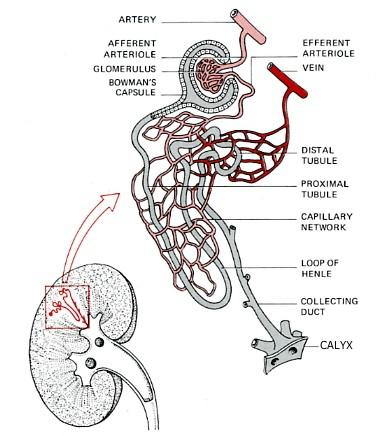
Diuresis is the condition in which
A. The excretion of volume of urine increases
B. The excretion of volume of urine decreases
C. The kidneys fail to excrete urine
D. The water balance of the body is disturbed
Answer
590.4k+ views
Hint: During diuresis our kidneys work vigorously. They produce more fluid due to different reasons.
Step by step answer:
Diuresis is a condition related to kidneys. The kidneys filter more body fluids leading to excess urine production by the body.
Signs and Symptoms:
1. More thirst
2. Fatigue
3. Confusion
4. Poor sleep
5. Weakness
The causes of diuresis are:
1. Osmotic diuresis: In this type, the kidneys produce more water or urine in order to get rid of some unwanted minerals. This can happen during diabetes when the body wants to get rid of excess sugar. It can also happen due to the consumption of mannitol. It is a sugar alcohol. It forces the body to remove excess sodium and water from the body through urine.
2. Water diuresis: In this type, the body eliminates clear and diluted urine. It is caused by diabetes insipidus. In this condition, the body passes too much fluid due to insufficient response to vasopressin hormone. This is a hormone that regulates body water storage. It also has three types: central, nephrogenic, gestational.
3. Forced diuresis: This happens when some medications are given to a person. They are prescribed in conditions like edema, liver disease, heart failure, and high blood pressure.
4. Hypercalcemia: When the amount of calcium increases in our body, the body excretes more urine.
5. Cold temperatures and high altitudes are other reasons which cause diuresis.

Note: In order to treat the problem which can cause drink dehydration, drink more water. Avoid alcohol and caffeine. If the cause is diabetes, we need to change medications in order to solve the problem.
Step by step answer:
Diuresis is a condition related to kidneys. The kidneys filter more body fluids leading to excess urine production by the body.
Signs and Symptoms:
1. More thirst
2. Fatigue
3. Confusion
4. Poor sleep
5. Weakness
The causes of diuresis are:
1. Osmotic diuresis: In this type, the kidneys produce more water or urine in order to get rid of some unwanted minerals. This can happen during diabetes when the body wants to get rid of excess sugar. It can also happen due to the consumption of mannitol. It is a sugar alcohol. It forces the body to remove excess sodium and water from the body through urine.
2. Water diuresis: In this type, the body eliminates clear and diluted urine. It is caused by diabetes insipidus. In this condition, the body passes too much fluid due to insufficient response to vasopressin hormone. This is a hormone that regulates body water storage. It also has three types: central, nephrogenic, gestational.
3. Forced diuresis: This happens when some medications are given to a person. They are prescribed in conditions like edema, liver disease, heart failure, and high blood pressure.
4. Hypercalcemia: When the amount of calcium increases in our body, the body excretes more urine.
5. Cold temperatures and high altitudes are other reasons which cause diuresis.

Note: In order to treat the problem which can cause drink dehydration, drink more water. Avoid alcohol and caffeine. If the cause is diabetes, we need to change medications in order to solve the problem.
Recently Updated Pages
Master Class 11 Business Studies: Engaging Questions & Answers for Success

Master Class 11 Computer Science: Engaging Questions & Answers for Success

Master Class 11 Economics: Engaging Questions & Answers for Success

Master Class 11 Social Science: Engaging Questions & Answers for Success

Master Class 11 English: Engaging Questions & Answers for Success

Master Class 11 Chemistry: Engaging Questions & Answers for Success

Trending doubts
Draw a diagram of nephron and explain its structur class 11 biology CBSE

Explain zero factorial class 11 maths CBSE

Chemical formula of Bleaching powder is A Ca2OCl2 B class 11 chemistry CBSE

Name the part of the brain responsible for the precision class 11 biology CBSE

The growth of tendril in pea plants is due to AEffect class 11 biology CBSE

One Metric ton is equal to kg A 10000 B 1000 C 100 class 11 physics CBSE




